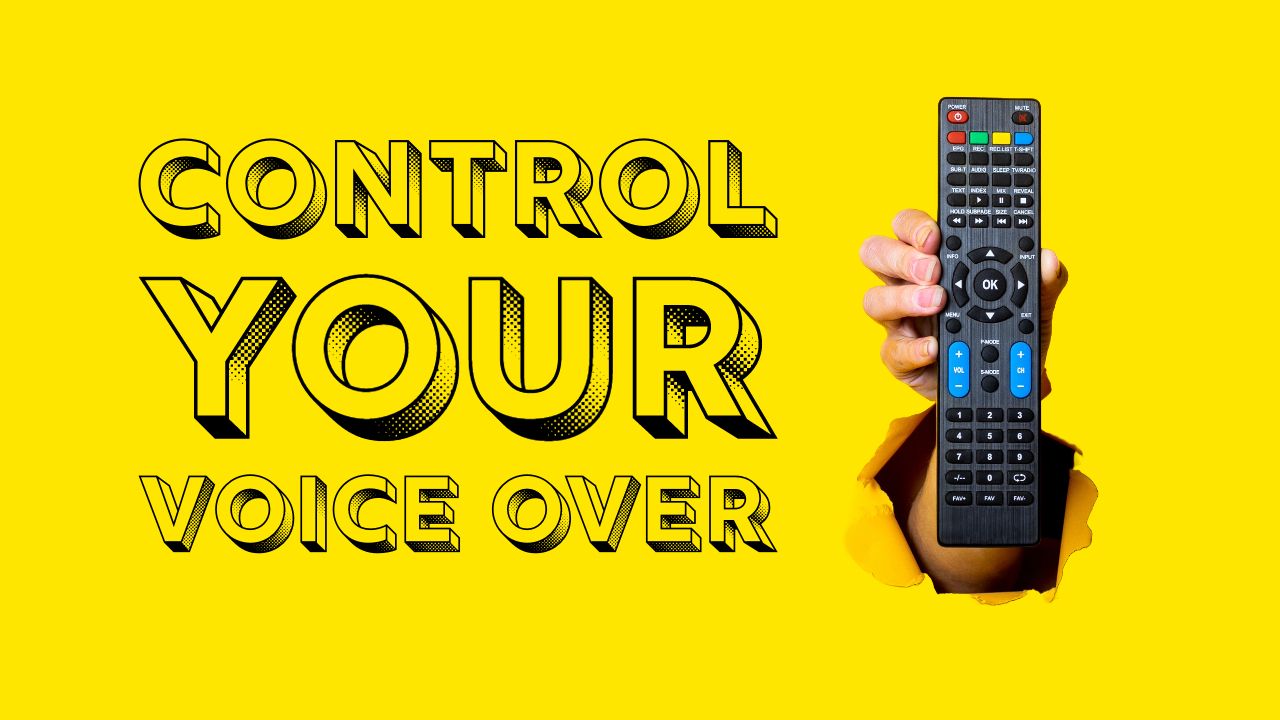How To Control the Voice For Better Voice Overs (5+ Tips)
Oct 04, 2023
Elevate Your Voice Overs With These Voice Control Methods Designed for Maximum Impact
Voice acting is a unique gig — really, there’s nothing quite like it out there.
And while having a great voice does help, knowing how to actually use it is the one factor that can truly set you apart from the rest of the inspiring voice actors out there.
Simply put: even if you're just starting out, understanding how to control your voice can be your ticket to success.
From the pitch to the tone, mastering the basics of voice control is key to landing voice acting jobs. But before we even start talking about getting a voice acting job, let’s take things a few steps back and look into some of the basics.
Ready to learn how to control your voice and stand out in the crowded world of voice acting? Check out some of my favorite tips.

What Is Voice Control and Why Does It Matter?
Before we jump into the tips, let's get a handle on what voice control really means.
At its core, voice control is about managing the pitch, tone, volume, and tempo of your voice. Think of it as the strings of a guitar — if they're not tuned right, the sound is definitely going to be off.
Well, your voice is pretty much the same. Proper control ensures you hit the right notes every time, especially when you're looking to bring a character or message to life.
But what does each tool do exactly? Here’s a quick breakdown of that:
- Pitch: It’s the highness or lowness of your voice. Every script might not require a deep baritone or a chirpy high-pitch — that’s why adaptability is the key. Learning how to work with the right pitch can make a difference between a reading that stands out and one that falls flat (literally).
- Tone: When we talk about tone, we’re referring to the character or quality of the voice. It can be warm, cold, friendly, hostile, and so on. Ultimately, the same line can convey entirely different meanings based on tone. Just give it a try! The phrase "Did you make this?" could imply admiration for a job well done or surprise at a potential mistake. The difference? All in the tone.
- Volume: Not every line needs to be shouted, much like not everything needs to be whispered. Effective use of volume can convey emotions, emphasize words, or set a scene's mood.
- Tempo: Much like the rhythm in music, tempo in voice acting determines the beat and pace of the narrative. A hurried delivery in voice acting can convey tension or excitement, while a slow tempo can bring out the emotions in a melancholic scene or give emphasis to every word. It's essential to match the tempo with the script's demands.
Detailed Tips on How to Control Your Voice
When stepping into voice acting for the first time, there's more to the game than just having a distinct voice — let’s be honest, you’re not Morgan Freeman (yet?).
At the end of the day, being a standout voice actor is about making your voice work for you — bending and shaping it to fit any role that comes your way. So, while you may have the gift of a great voice, it's also crucial to master how to control it effectively.
With this in mind, if you're serious about voice acting, it's time to fine-tune that wonderful voice of yours.
Here's the lowdown on how to do exactly that:
1. Breathing Techniques
Your breath is the foundational support for your voice. Before even delving into vocal nuances, it's crucial to get your breathing right. When you breathe deeply from the diaphragm, it provides the necessary strength and stability to your voice.
Here’s a quick test: place your hand on your stomach, and take a breath. Does the hand move out? Bingo! That's the kind of breathing that's got your vocal back — especially for those marathon voice-over gigs.
2. Warm-Up Routines
In the same way a musician would never perform without tuning their instrument, voice actors shouldn't jump into a session cold. That’s why it’s so important to incorporate a warm-up routine to get those vocal cords ready.
Simple voice acting exercises — such as humming scales or tongue twisters — can fine-tune your range, ensuring you can hit both the high notes and the bass notes with equal ease. Tongue twisters aren't just fun; repeating them can enhance your articulation, making sure every word you say is crisp and clear.
3. Posture Check
Believe it or not, the way you position your body has a direct impact on your voice. Proper posture ensures optimal airflow and resonance.
This isn’t just about looking professional — it's about sounding professional too. Whether you're standing or sitting during a voice-over session, keep your back straight, shoulders relaxed, and chin slightly lifted. This alignment lets your voice project clearly and consistently.

4. Pitch Practice
We talked about pitch earlier and I’m bringing it back because it’s just that important. The versatility of a voice actor often hinges on their ability to switch between pitches seamlessly. Whether a script requires the innocence of a child's voice or the gravitas of a narrator — or even a touch of “vocal fry” for that modern, laid-back tone — pitch control is key.
A good exercise for this is mimicking the rise and fall of sirens. Regular practice in modulating between pitches ensures you can take on a diverse range of roles.
5. Pace Yourself
In voice acting, timing is everything. A rushed narrative can leave listeners overwhelmed, while a too-slow pace can lead to disinterest. Familiarize yourself with different script demands.
Whether it's the rapid banter of an advertisement or the leisurely pace of an audiobook, practicing how your voice behaves at varied speeds and perfecting those transitions ensures your delivery is always spot on.
Why Voice Control Matters for Voice Actors
Diving into voice acting? One of the first things you’ll realize is the immense power that lies in the subtle control of your voice.
Remember: this isn’t just about sounding “good” — it's about harnessing that vocal power to captivate, convince, and connect. And that's where knowing how to control your voice enters the spotlight.
Here’s why knowing how to control your voice is a game-changer:
- Consistency in sessions
When it comes to voice acting, directors don't just want talent — they want reliability. With proper voice control, you're not only impressing them with your skill, but you’re also assuring them of a consistent performance from start to finish. - Versatility
Think about it. One day you're voicing a sprightly fairy for an animated series, and the next, you’re the deep-voiced narrator for a documentary. That's the beauty of voice acting — and a strong grip on your vocal range helps you seamlessly switch roles when needed, where needed. - Longevity
In voice acting, it’s not just about the now; it's about the long run. Adopting the right techniques when it comes to controlling your voice ensures that you’re not straining those precious vocal cords. This means more hours in the studio without the risk of fatigue or damage — both of which could put a quick halt to your career.
From there — and once you’ve improved control over your voice — you can start checking out websites like Academy Voices, a voice over agency for voice actors run by voice actors.

Benefits Beyond the Studio
But wait, there’s more! Good voice control isn't restricted to the confines of a studio. It's a skill that amplifies your presence, both in and out of the booth.
For instance:
- Communication
Ever notice how some people just command attention when they speak? It's not always what they say, but how they say it. A well-controlled voice can elevate your everyday conversations — helping you to exude the confidence you want and ensuring you're heard and understood, no matter the situation. - Public Speaking and Performance
On any given day, you might find yourself at a local open-mic, giving a toast at a wedding, or leading a workshop. Good voice control techniques will not only give you the confidence to step onto any stage but also give that added boost to your message, story, or song so it’s delivered with clarity and charisma. - Personal Branding
Whether you're networking, interviewing for a non-voice acting job, or just making a first impression, the way you speak can say a lot about you. With voice control, you can present a more confident, memorable version of yourself to the world.
Final Thoughts and Your Next Steps
Understanding how to control your voice isn't just a cool party trick — it's the bedrock of a successful voice acting career. Whether you've been in the industry for years or are just setting foot on this path, there's always room to enhance this pivotal skill.
At A VO’s Journey, we're here to support your passion. With personalized guidance and voice acting courses tailored to your needs, we're dedicated to helping you achieve your voice acting goals — regardless of your experience level.






